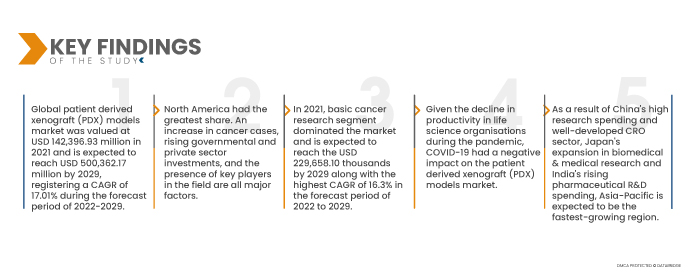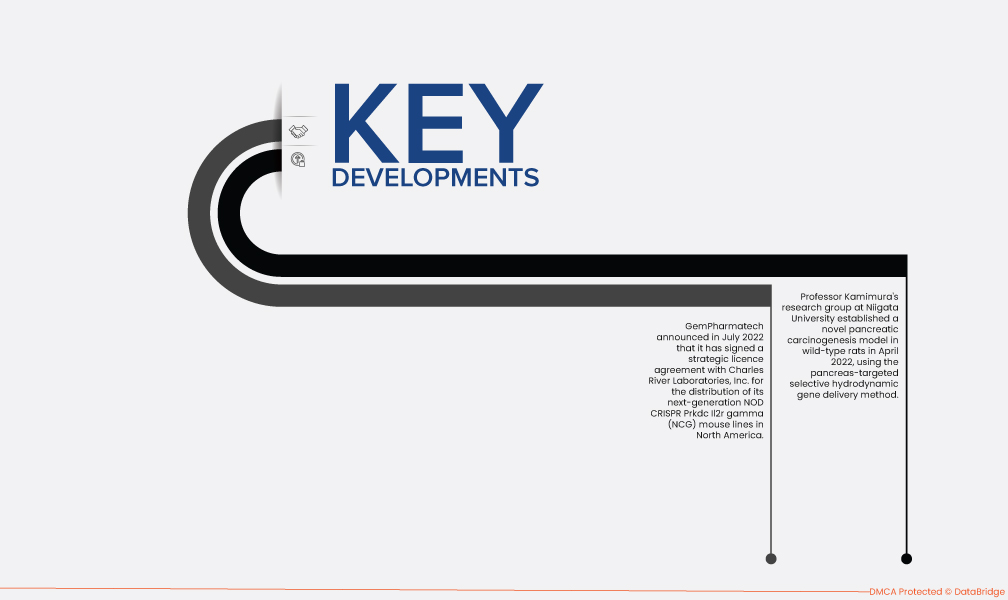PDX モデルは、がんの特性を特定し、新しい治療法を開発し、治療の成功を予測するための効果的なツールとして広く認識されるようになっています。近年、発がんを理解するために卵巣腫瘍の PDX モデルを開発する試みが増加しています。生着率は悪性腫瘍と腫瘍の種類によって異なります。子宮頸がんの PDX モデルの生着成功率は 66.7% ~ 71.4% の範囲でしたが、子宮内膜がんの PDX モデルの生着成功率は 60% ~ 86% の範囲でした。PDX モデルにおける卵巣がんの生着成功率は 45.5% ~ 100% の範囲でした。
完全なレポートにアクセス @https://www.databridgemarketresearch.com/reports/global-pdx-models-market
患者由来異種移植(PDX)モデルの世界市場 2021年には1,423億9,693万米ドルと評価され、2029年までに5,003億6,217万米ドルに達すると予想されており、2022年から2029年の予測期間中に17.01%のCAGRを記録します。患者由来異種移植片 (PDX) モデル市場の成長を促進する主な要因の 1 つは、世界中で個別化医療に対する需要が高まっていることです。資金や投資の形でガン研究に対する公的および民間部門の継続的な支援が市場の成長を加速させています。資金や投資の形でガン研究に対する公的および民間部門の継続的な支援が市場の成長を加速させています。
世界中で高まる個別化医療への需要 市場の成長率を牽引すると予想される
個別化医療とは、患者様お一人お一人の個性に合わせたオーダーメイドの治療法です。個別化医療は、現在および今後発生する健康問題の特定と管理に関する私たちの考え方を変える可能性を秘めています。実際の患者と PDX モデルは類似しているため、これらのモデルは個別化医療の進歩における忠実度の変換によく使用されます。これらのモデルには独自の特徴があり、そのため親腫瘍組織に対する忠実度を維持することが求められています。
レポートの範囲と市場セグメンテーション
|
レポート指標
|
詳細
|
|
予測期間
|
2022年から2029年
|
|
基準年
|
2021
|
|
歴史的な年
|
2020 (2014 ~ 2019 にカスタマイズ可能)
|
|
量的単位
|
収益(百万米ドル)、数量(単位)、価格(米ドル)
|
|
対象セグメント
|
タイプ (マウスモデル、ラットモデル)、腫瘍タイプ (呼吸器腫瘍モデル、泌尿器腫瘍モデル、消化管腫瘍モデル、血液腫瘍モデル、婦人科腫瘍モデル、その他)、アプリケーション (前臨床医薬品開発および腫瘍学研究、バイオマーカー分析)、エンドユーザー(受託研究機関、学術研究機関、製薬・バイオ企業)
|
|
対象国
|
北米では米国、カナダ、メキシコ、ヨーロッパではドイツ、フランス、英国、オランダ、スイス、ベルギー、ロシア、イタリア、スペイン、トルコ、ヨーロッパではその他のヨーロッパ、中国、日本、インド、韓国、シンガポール、マレーシア、オーストラリア、タイ、インドネシア、フィリピン、アジア太平洋地域 (APAC) ではその他のアジア太平洋地域 (APAC)、中東およびアフリカ (MEA) の一部としてサウジアラビア、UAE、南アフリカ、エジプト、イスラエル、中東およびアフリカ (MEA) の一部としてその他の中東およびアフリカ (MEA)、南米の一部としてブラジル、アルゼンチン、南米のその他の地域
|
|
対象となる市場関係者
|
Crown Bioscience Inc. (米国)、THE JACKSON LABORATORY (米国)、Champions Oncology, Inc. (米国)、Charles River Laboratories (米国)、Wuxi AppTec (中国)、Oncodesign (カナダ)、Aragen Bioscience (インド)、Biocytogen (米国)、Bioduro (米国)、Creative Animodel (米国)、Covance Inc. (米国)、EPO Berlin-Buch GmbH (ドイツ)、EUROPDX。 (ベルギー)、Explora BioLabs (米国)、Hera BioLabs (米国)、Horizon Discovery Ltd. (英国)、Pharmatest Services (フィンランド)、Urospehere SAS (キプロス)、Xentech (フランス)、Xenopat (フランス) など
|
|
レポートで取り上げるデータポイント
|
データブリッジ市場調査チームが厳選した市場レポートには、市場価値、成長率、市場セグメント、地理的範囲、市場プレーヤー、市場シナリオなどの市場洞察に加えて、詳細な専門家分析、患者疫学、パイプライン分析が含まれています。 、価格分析、および規制の枠組み
|
セグメント分析:
世界の患者由来異種移植(PDX)モデル市場は、タイプ、腫瘍タイプ、用途、技術、エンドユーザー、流通チャネルに基づいて 4 つの 6 つのセグメントに分類されています。
- タイプに基づいて、世界の患者由来異種移植片(PDX)モデル市場はマウスモデルとラットモデルに分類されます。 2021年にはマウスモデルが市場を独占し、2022年から2029年の予測期間では17.3%という最高のCAGRとともに、2029年までに3億8,225万2,333千米ドルに達すると予想されています。これは、マウスモデルの使用を伴う研究開発の熟練度が増加しているためです。マウスモデルの。
- 腫瘍の種類に基づいて、世界の患者由来異種移植(PDX)モデル市場は、消化管腫瘍モデル、肺腫瘍モデル、血液腫瘍モデル、婦人科腫瘍モデル、呼吸器腫瘍モデル、泌尿器腫瘍モデルなどに分類されます。2021年には、消化管腫瘍モデルセグメントが市場を支配し、2022年から2029年の予測期間に17.0%の最高のCAGRとともに、2029年までに246,623.76千米ドルに達すると予想されています。世界レベルでの消化管腫瘍の数の増加は、このセグメントの成長を後押ししています。
- アプリケーションに基づいて、世界の患者由来異種移植(PDX)モデル市場は、基礎癌研究、前臨床薬開発、バイオマーカー分析、共臨床試験、精密医療に分類されます。 2021年には、がんの基礎研究セグメントが市場の大半を占め、2022年から2029年の予測期間では16.3%という最高のCAGRとともに、2029年までに229,658.1万米ドルに達すると予想されています。がん研究に向けた研究開発活動への支出の増加は、セグメントの成長を促進します。
- 技術に基づいて、世界の患者由来異種移植(PDX)モデル市場は、異所性移植と同所性移植に分類されます。2021年には、異所性移植セグメントが市場を支配し、2022年から2029年の予測期間に16.8%の最高のCAGRとともに、2029年までに423,459.22米ドルに達すると予想されています。
異所性移植セグメント の創傷タイプセグメントを支配します。 患者由来異種移植(PDX) モデル 市場
- 2021 年には、異所性移植セグメントが支配的なセグメントとして浮上しました。これは、異所性移植の利点についての認識が高まり、市場の成長をさらに促進するためです。また、ヘルスケア産業の成長と拡大、個人の可処分所得の増加により、この分野の成長と優位性が再び強化されるでしょう。
- エンドユーザーに基づいて、世界の患者由来異種移植片(PDX)モデル市場は、学術研究機関、受託研究機関、製薬会社およびバイオテクノロジー企業に分類されます。 2021年には、学術研究機関セグメントが市場を支配し、2022年から2029年の予測期間で16.5%のCAGRとともに、2029年までに351,297.33千米ドルに達すると予想されます。
学術および研究機関は、エンドユーザーセグメントを支配しています。 患者由来異種移植片 (PDX) モデル 市場
- 2021年には、学術・研究機関セグメントが主要なセグメントとして浮上しました。これは、インドや中国などの発展途上国におけるインフラ施設の増加によるものです。また、医療専門家の数の増加も市場の成長をさらに後押ししました。
主なプレーヤー
Data Bridge Market Research は、以下の企業を主要な市場プレーヤーとして認識しています: Crown Bioscience Inc. (米国)、THE JACKSON LABORATORY (米国)、Champions Oncology, Inc. (米国)、Charles River Laboratories (米国)、Wuxi AppTec (中国)、Oncodesign (カナダ)、Aragen Bioscience (インド)、Biocytogen (米国)、Bioduro (米国)、Creative Animodel (米国)、Covance Inc. (米国)、EPO Berlin-Buch GmbH (ドイツ)、EUROPDX. (ベルギー)、Explora BioLabs (米国)、Hera BioLabs (米国)、Horizon Discovery Ltd. (英国)、Pharmatest Services (フィンランド)、Urospehere SAS (キプロス)、Xentech (フランス)、Xenopat (フランス)。
市場開拓
- GemPharmatech (ジェムファーマテック株式会社) は、2022 年 7 月に、北米における次世代 NOD CRISPR Prkdc Il2r ガンマ (NCG) マウスラインの独占販売のため、Charles River Laboratories, Inc. と戦略的ライセンス契約を締結したと発表しました。 。 2023 年から、チャールズ リバーは市販モデルを使用して財団コロニーを設立します。
- 新潟大学の神村教授らの研究グループは、膵臓を標的とした選択的流体力学的遺伝子送達法を用いて、野生型ラットにおける新たな膵臓発がんモデルを2022年4月に確立した。
地域分析
地理的に、市場レポートの対象国は、米国、米国ではカナダおよびメキシコ、北米ではカナダおよびメキシコ、ドイツ、フランス、英国、オランダ、スイス、ベルギー、ロシア、イタリア、スペイン、トルコ、欧州ではその他のヨーロッパです。 、中国、日本、インド、韓国、シンガポール、マレーシア、オーストラリア、タイ、インドネシア、フィリピン、アジア太平洋地域(APAC)のその他の地域(APAC)、サウジアラビア、UAE、南アフリカ、エジプト、イスラエル、中東およびアフリカ (MEA) の一部としての中東およびアフリカ (MEA) のその他の地域、南アメリカの一部としてブラジル、アルゼンチン、および南米のその他の地域。
Data Bridge Market Research の分析によると:
北米は、 患者由来異種移植(PDX) モデル 市場 2022年から2029年の予測期間中
北米が最大のシェアを占めました。がん症例の増加、政府および民間部門の投資の増加、この分野における主要企業の存在はすべて主要な要因です。資金提供対象に選ばれた乳がん研究プロジェクトは、スクリーニング、検出、高精度腫瘍学、患者報告の転帰の改善に重点を置くことで、乳がんを患うカナダ人女性のケアを改善することになる。
アジア太平洋地域は、世界で最も急速に成長している地域であると推定されています。 患者由来異種移植片 (PDX) モデル 市場 予測期間 2022 年から 2029 年
中国の高額な研究支出とよく発達したCROセクター、日本の生物医学および医学研究の拡大、インドの医薬品研究開発支出の増加、シンガポールのトランスレーショナルおよび生物医学研究の拡大の結果、アジア太平洋地域は、他の国々と比べて最も急成長する地域になると予想されている。予測期間。
新型コロナウイルス感染症の影響分析
パンデミック中のライフサイエンス組織の生産性の低下を考えると、COVID-19は患者由来異種移植(PDX)モデル市場に悪影響を及ぼしました。治療領域における製薬R&D取引の減少、臨床試験の中断、国別のロックダウンはすべて市場に影響を及ぼしました。腫瘍学、ID /抗感染薬、心血管疾患、呼吸器疾患が最も影響を受けた試験でした。パンデミック後のシナリオではCOVID-19の影響が薄れると予想されるため、市場は再成長するでしょう。
詳細については、 患者由来異種移植片 (PDX) モデル 市場 レポートはこちらをクリックしてください –https://www.databridgemarketresearch.com/reports/global-pdx-models-market














